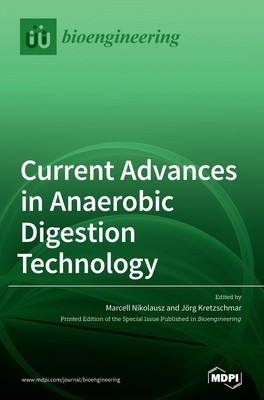
- We will send in 10–14 business days.
- Publisher: MDPI AG
- ISBN-10: 303650222X
- ISBN-13: 9783036502229
- Format: 17 x 24.4 x 1.9 cm, kieti viršeliai
- Language: English
- SAVE -10% with code: EXTRA
Current Advances in Anaerobic Digestion Technology (e-book) (used book) | bookbook.eu
Reviews
Description
Anaerobic digestion (AD) is one of the oldest biotechnological processes and originally referred to biomass degradation under anoxic conditions in both natural and engineered systems. It has been used for decades to treat various waste streams and to produce methane-rich biogas as an important energy carrier, and it has become a major player in electrical power production. AD is a popular, mature technology, and our knowledge about the influencing process parameters as well as about the diverse microbial communities involved in the process has increased dramatically over the last few decades. To avoid competition with food and feed production, the AD feedstock spectrum has constantly been extended to waste products either rich in recalcitrant lignocellulose or containing inhibitory substances such as ammonia, which requires application of various pre-treatments or specific management of the microbial resources. Extending the definition of AD, it can also convert gases rich in hydrogen and carbon dioxide into methane that can substitute natural gas, which opens new opportunities by a direct link to traditional petrochemistry. Furthermore, AD can be coupled with emerging biotechnological applications, such as microbial electrochemical technologies or the production of medium-chain fatty acids by anaerobic fermentation. Ultimately, because of the wide range of applications, AD is still a very vital field in science. This Special Issue highlights some key topics of this research field.
EXTRA 10 % discount with code: EXTRA
The promotion ends in 23d.04:18:08
The discount code is valid when purchasing from 10 €. Discounts do not stack.
- Publisher: MDPI AG
- ISBN-10: 303650222X
- ISBN-13: 9783036502229
- Format: 17 x 24.4 x 1.9 cm, kieti viršeliai
- Language: English English
Anaerobic digestion (AD) is one of the oldest biotechnological processes and originally referred to biomass degradation under anoxic conditions in both natural and engineered systems. It has been used for decades to treat various waste streams and to produce methane-rich biogas as an important energy carrier, and it has become a major player in electrical power production. AD is a popular, mature technology, and our knowledge about the influencing process parameters as well as about the diverse microbial communities involved in the process has increased dramatically over the last few decades. To avoid competition with food and feed production, the AD feedstock spectrum has constantly been extended to waste products either rich in recalcitrant lignocellulose or containing inhibitory substances such as ammonia, which requires application of various pre-treatments or specific management of the microbial resources. Extending the definition of AD, it can also convert gases rich in hydrogen and carbon dioxide into methane that can substitute natural gas, which opens new opportunities by a direct link to traditional petrochemistry. Furthermore, AD can be coupled with emerging biotechnological applications, such as microbial electrochemical technologies or the production of medium-chain fatty acids by anaerobic fermentation. Ultimately, because of the wide range of applications, AD is still a very vital field in science. This Special Issue highlights some key topics of this research field.


Reviews